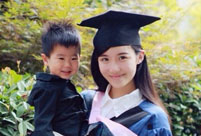 High speed train attendants receive training in Chongqing
High speed train attendants receive training in Chongqing
 Rare rainbow clouds seen in Fujian
Rare rainbow clouds seen in Fujian
 Small bracelet going global
Small bracelet going global
 Aerial Photography: Amazing Tianshan Mountains
Aerial Photography: Amazing Tianshan Mountains
 'Animals' in 2014 World Cup
'Animals' in 2014 World Cup
 Not afraid of death
Not afraid of death
 Chen Guangbiao ads on A15 of NYT to host charity luncheon for 1,000 poor and destitute Americans
Chen Guangbiao ads on A15 of NYT to host charity luncheon for 1,000 poor and destitute Americans
 Passionate bar babies and fans feel the charm of World Cup 2014
Passionate bar babies and fans feel the charm of World Cup 2014
 US aircraft carrier docks in HK, welcomes PLA aboard
US aircraft carrier docks in HK, welcomes PLA aboard
 Graduation season: 'Take graduation photos to mark our love'
Graduation season: 'Take graduation photos to mark our love'
Hundreds of thousands of Hongkongers voted online, via smartphones and polling booths in a ten-day unofficial referendum that ended on Sunday. It was deemed illegal by the central government.
However, the vote was designed, conducted and concluded in a way that has raised questions about its political goals. The "Occupy Central" protest group offered voters three choices in support of electing the chief executive by popular vote, but none against. Also, external observers were not used. Furthermore, instead of 10 days, most parliamentary democracies use a single election day.
In practice, the number of voters in the "democracy poll" represented one-tenth of Hong Kong's population of seven million, and a fifth of registered voters.
Economic integration is measured by flows of trade, investment, and people. Today, the mainland is Hong Kong's largest export partner and its largest import partner. And more than 75 percent of the inflows of foreign direct investment can be traced directly to the mainland or to Chinese companies incorporated abroad.
In 2013, Hong Kong received a whopping 55 million visitors, including 26 million tourists, of these, 75 percent of all visitors and 67 percent of all tourists were from the mainland.
As incomes have risen in the mainland, the number of the mainland tourists visiting Hong Kong has soared, which has led to complaints. And yet, mainland tourism also makes a huge contribution to Hong Kong's economy. In fact, it stems from the 2003 Individual Visit Scheme, which the central government launched to support Hong Kong after its economy had been hit by the outbreak of SARS.
The political forces that would prefer the mainland to play little or no role in Hong Kong ignore the realities that, without the mainland, it would be left with only half of its trade, one-fourth of its foreign investment and visitors, not to mention only one-tenth of its water and food supply.
A small minority in Hong Kong may consider such a path politically desirable. But most see it as an economic nightmare.
In early 2013, pro-democracy forces in Hong Kong participated in protest marches with many demonstrators carrying the former British colonial flag of Hong Kong. Some of the misguided colonialist nostalgia has been accompanied by anti-mainlander discrimination, even virulent bullying.
The political irony is overwhelming. When Hong Kong was under British administration from 1841 to 1997, the UK did not promote democracy. That only began just before and especially after the reunification.
The difference in average living standards is even more poignant. From the launch of reform and opening-up to the reunification, Hong Kong's living standards quadrupled. In 1980, they were 40 percent below those in the UK; in 1997, 15 percent higher.
This growth was not automatic. Amidst the handover, the Asian financial crisis caused property prices to plunge in Hong Kong. But by early 1998, then premier Zhu Rongji promised the central government would protect Hong Kong "at all costs". And as the central government bought stocks and futures, the speculative attacks were rebuffed.
 |
 Female master poses for graduation photos with son
Female master poses for graduation photos with son Silk Road, China's Grand Canal listed as World Heritage Sites
Silk Road, China's Grand Canal listed as World Heritage Sites PKU students imitate famous paintings in real-person photos
PKU students imitate famous paintings in real-person photos Chinese 'Slumdog Millionaire'
Chinese 'Slumdog Millionaire' Puzhehei: land of idyllic beauty
Puzhehei: land of idyllic beauty Stewardesses in Brazilian soccer jerseys
Stewardesses in Brazilian soccer jerseys Chinese navy fleet visits Cape Town, South Africa
Chinese navy fleet visits Cape Town, South Africa PLA naval cadets toss their hats at graduation ceremony
PLA naval cadets toss their hats at graduation ceremony Graduation photo ideas: reliable alumnus and happy alumna
Graduation photo ideas: reliable alumnus and happy alumna Islands in S. China Sea better shown on new vertical atlas of China
Islands in S. China Sea better shown on new vertical atlas of China Girl takes father’s portrait to travel the world
Girl takes father’s portrait to travel the world Images of Xi'an: Part one
Images of Xi'an: Part one In Pictures: Female fans of World Cup
In Pictures: Female fans of World Cup Top 20 hottest women in the world in 2014
Top 20 hottest women in the world in 2014  China's top 10 representative architectures
China's top 10 representative architecturesDay|Week|Month